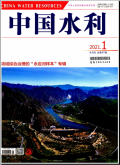中国水利Issue(12):7-12,6.
河流伦理的三个维度:理论渊源、文化积淀与历史实践
Three dimensions of river ethics:theoretical origins,cultural accumulation and historical practice
摘要
Abstract
Although river ethics is put forward in response to current river problems,it should be understood and constructed within the context and logic of history.Specifically,it is to strengthen the construction in three dimensions:the theoretical origins of Marxism,the accumulation of traditional culture and historical practice.Deeply exploring the logical connection between Marxist ecological views and river ethics will help further improve the theoretical foundation of river ethics,deeply absorb the wisdom from traditional culture,enrich the cultural connotations and Chinese wisdom of river ethics,fully and systematically summing up and learning from the experience and lessons of historical water conservancy projects is not only a necessary part of constructing river ethics,but also helps to provide historical reference for concrete practice.In this way,we can make the ethics of rivers more practical,solid,and coherent,and create ideas,proposals,and plans that reflect China's position,wisdom,and values.To promote the transformation of human cognitive concepts and contribute to the construction of a harmonious and symbiotic Earth home between humans and nature.关键词
河流伦理/马克思主义生态观/传统文化/历史实践/中国方案Key words
river ethics/Marxist ecological view/traditional culture/historical practice/Chinese solution分类
建筑与水利引用本文复制引用
张俊峰,李杰..河流伦理的三个维度:理论渊源、文化积淀与历史实践[J].中国水利,2024,(12):7-12,6.基金项目
山西大学学科交叉建设项目"历史时期华北乡村社会治理及其当代价值研究". ()

